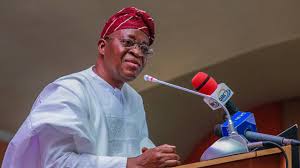Last week, the three main freight forwarding groups withdrew their services from Lagos ports in protest against what they called high cost of doing businesses in the ports.
Prior to the last Monday industrial action, the freight forwarders had not only complained of arbitrary charges, they had also given notice of intention to withdraw their services.
What happened last week is reminiscent of what the National Council of Managing Directors of Licensed Customs Agents did on March 17, 2007 at the premises of Port and Cargo Handling Services
The licensed customs agents had accused the terminal operator of arbitrary charges and of giving their customers crazy bills. To give vent to their anger, the clearing agents, led by their national president, Mr. Lucky Amiwero did the most illegal- they proceeded to seal-off the corporate head office of the terminal operator.
Were it not for the timely intervention of the Police, the protesters would have taken possession of the premises of the indigenous terminal operator or worse still, the security personnel of the company would have risen to the challenge and would have rough-handled the agents.
Although, the 2007 incident and the one of last week share similarities from the perspective of the aim, but the scope and the steps that were taken prior to the action differ a lot.
We are only interested in the rationale behind the March 2007 action and the one of last week. Right from the onset of port concession, freight forwarders have always complained about the charges which are allegedly imposed on them by the terminal operators; in some cases for services not rendered. Their cries have continually fallen on deaf ears.
Prior to last week’s decision to withdraw their services, the freight forwarders have at every opportunity complained of excessive and arbitrary charges on the part of the terminal operators and shipping companies as well as extortion on the part of customs officers and others.
While sympathising with the freight forwarders, we will like to ask the following questions: where are the importers in all of these and why should they be silent while freight forwarders face the fire? It is also pertinent to ask the embittered freight forwarders if they duly informed the Council for the Regulation of Freight Forwarding before embarking on withdrawal of services.
This does not mean that we are not in support of their action, and it also does not indicate our endorsement of the action. We are only thinking aloud on the implications of their action on port operations, especially now that everyone is trying to assist in the process of clearing of the estimated 10,000 containers that have piled up in the ports for months.
Cross sections of stakeholders have accused freight forwarders of being the only group that are not making any sacrifice towards current effort aimed at decongesting the ports. They accused licensed customs agents of standing in the front row to accuse terminal operators of high charges, when they are also guilty of imposing ridiculous charges on importers.
Our concern at this point is the hydra headed issue that is called
port charges. The freight forwarders do not have regulated charges or scale of charges that are uniform. Secondly, majority of importers do not have sufficient knowledge of the dynamics of port tariffs and charges. Similarly, in spite of port concession, there still exist in the port system several ‘unreceipted’ charges which importers and licensed customs agents pay.
Rather than look at then protests by licensed customs agents in isolation, we believe that the time is ripe for the Government to take more than a casual interest in port activities post-concession.
Nothing has changed in the ports except that Nigerian Ports Authourity (NPA) is no longer the master stevedore; having handed over terminal operations to the private sector and also except that Customs now does more of examination. The ports system still comprise of institutional players such as the Customs (and its private sector service providers who play significant role), NPA itself, Standards Organisation of Nigeria, National Agency for Food and Drugs Administration and Control, shipping companies, terminal operators, stevedoring companies, dockworkers, Police and other security agencies, to mention some.
The present logjam over alleged excessive charges can not be blamed solely on terminal operators; rather it further exposes the missing leg on which port concession should be standing on.
It is on record that in spite of repeated calls for the creation of a regulatory agency for post-port concession business relationships, government has done nothing.
It is legally not the duty of the NPA to act as commercial regulator and query terminal operators for allegedly imposing higher charges on importers and their agents. It is the duty of the much-expected National Transport Commission (NTC).
Although coming rather too late, the National Assembly is reported to have renewed its interests in the NTC bill and is set to commence debate on it.
We urge the legislators; especially the marine transport committees of both chambers to show more responsiveness to the plight of members of the shipping community by giving the bill accelerated hearing.
It is however rather shocking that the embittered freight forwarders refuse to grant audience to the chief executives of both NPA and Nigerian Shippers’ Council who attempted to broker peace. The two agencies are directly concerned; the former being owners of the ports while the later is the agency responsible for protecting the interest of importers, exporters and their freight forwarders.
















Discussion about this post